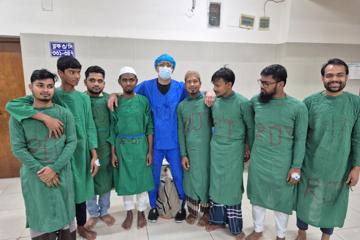Moorfields Eye Hospital consultant ophthalmologists Mahi Muqit and Niaz Islam were invited to Dhaka by Bangladesh’s interim government to help 120 patients with bullet wounds to their eyes. Their injuries were a result of their involvement in protests against the previous government last summer, and 24 of these patients received complex sight saving surgery across two days of intensive support.
During the July and August 2024 anti-discrimination movement in Bangladesh, around 1000 people suffered a range of ocular trauma during demonstrations across the country. Approximately 700 of these had received emergency treatment from National Institute of Ophthalmology and Hospital (NIOH) doctors, with many vitreoretinal surgeries being performed for bullets or fragments lodged inside their eyes.
During surgery, the team discovered that Minhaj, 20, still had the original bullets inside his eye from last July, needing a complex operation to successfully remove them and fix the retinal detachment.
Mahi detailed the stories for some of the people they helped:

“Rohan is smiling now because our surgery meant he could already see better. He was with friends when he was shot in both eyes by the Police. He was blinded in both eyes, with one being beyond hope. Our operation on the other eye fixed his retinal detachment and removed scar tissue. We have every expectation that his vision will continue to improve as he recovers from the surgery.

“Romel also lost his vision as a result of an injury last year. His surgery also repaired a retinal detachment after bullet trauma, and he was also very pleased to hear that his vision will slowly improve.”
The Moorfields pair were invited by the NIOH under the auspices of the interim Government Ministry of Health.
The purpose of this humanitarian trip was to see and treat further patients, giving them both specialist diagnosis and treatment. They also worked alongside local doctors and provided medical and surgical teaching and training to them to strengthen the ability of NIOH to provide high-quality assessment and treatment services for these patients going forward.
Between them, the doctors evaluated 120 patients over two days. The patients, aged between 14 and 30, had suffered bullet injuries and the majority had received initial treatment last year.
Patients who did not receive surgery were given a rehabilitation plan for the community, agreed with local doctors, for them to consider and implement.
Mahi and Niaz also met with the Health Adviser of the interim Government, at the Ministry of Health, in order to provide a debrief of the operations/services provided.
Mahi Muqit said: “It was an honour to be invited to help these people, and an intense experience for all of us. It’s such a privilege to be able to restore sight to people who have lived with sight loss for months.”
Niaz Islam added: “I was delighted to be able to share our expertise and experience with colleagues at NIOH – we hope our legacy lies in having transferred skills to them, so they can in turn offer sight-saving surgery to many others affected by eye trauma in Bangladesh.”

Mahi Muqit is a senior vitreoretinal consultant at Moorfields, and has worked with NIOH retina doctors over the past 10 years in conjunction with Helen Keller International. He is familiar with the infrastructure and excellent diagnostic, treatment and surgical eyecare provided at NIOH. Mr Muqit provided surgery for 24 patients during the trip. The patients who had surgery will typically see improvements in their vision around four weeks after their surgery.
Niaz Islam is a senior medical retina expert at Moorfields and provided expert opinions and advice to the patients on their macular and retinal disorders suffered through bullet-induced eye trauma.
Assessing Romel, a victim of the protests in Bangaldesh
video transcript
This video contains general background noise only.
15 April 2025
